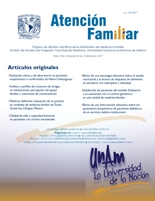Quality of Life and Functional Capacity of Patients with Rheumatoid Arthritis
Main Article Content
Abstract
Objective: to determine the quality of life and functional capacity of patients with rheumatoid arthritis. Methods: prospective and descriptive survey to patients with rheumatoid arthritis in the Family Medicine Unit (fmu) no. 66 in Xalapa, Veracruz, from February to November 2015, applying Qol-RA and haq tests to measure quality of life and functional capacity, respectively. Results: 217 patients, predominantly female (92%), with an average age of 55 years. The average time of disease progression was seven years; 100% of the population had treatment based on disease modifying drugs. The quality of life by Qol-RA was good for most of them (7.3), with the highest score in support (8.4) and the lowest nervous tension (6.6). In general, mild disabilities were found by haq (0.77), with greater affectation in reaching for objects (1.35) and lower in dressing and grooming (0.34). Using the Pearson correlation coefficient it was observed that everyday activities are negatively related with the presence of pain and arthritis. Conclusion: arthritis rheumatoid patients assigned to the fmu no. 66 showed good quality of life and mild disabilities, with a negative correlation between the two variables.
Downloads
Download data is not yet available.
Article Details
How to Cite
Espinosa Balderas, D., Hernández Sosa, M. del C., & Cerdán Galán, M. (2017). Quality of Life and Functional Capacity of Patients with Rheumatoid Arthritis. Atención Familiar, 24(2). https://doi.org/10.22201/facmed.14058871p.2017.2.59153
